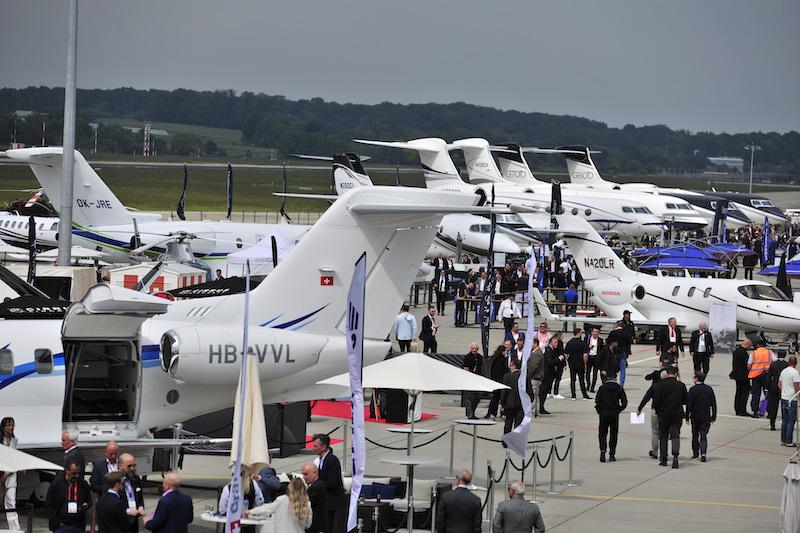
GENEVA—The business aviation sector needs to work together to secure its share of limited global sustainable aviation fuel (SAF) supply that the industry badly needs to help decarbonization efforts, a Dassault executive told a May 23 panel here at EBACE that also touched on the need for more transparency over the makeup of alternative fuels.
For now, scarce and expensive SAF is made from a limited range of feedstocks. Until recently there was even a lack of certainty as to how much SAF would be required in the coming decades. There is some clarity of that point now after an agreement of long-awaited SAF blending targets at European level last month through the ReFuelEU legislation. The policy should spur much-needed investment, but competition for feedstock remains.
Other industries are competing with aviation for the production capacity that can refine SAF. But Thierry Lamant, Dassault Aviation’s director of Falcon operation sustainability, told the panel that the business aviation sector also faced a threat from commercial airlines when it comes to securing SAF supply.
“I am especially afraid because of the airlines, which are making strong commitments for their own procurement of SAF. I’m afraid that will drive the production mainly to the airlines and there is a risk for business aviation, if we don’t unify, that we will lack SAF in the near future.”
“This is my personal feeling, but when I discuss with Air France-KLM or see what happens with Lufthansa, United, British Airways… Those guys are already making long-term supply contracts, they are booking SAF. So it’s important that we federate and secure supply for the coming years,” Lamant said.
“There’s only so much you can produce in the plants that exist today,” said Sven Rieve, sustainability advisor at Air bp. On a positive note, Rieve said the agreement on a variety of possible SAF feedstocks in the EU legislation would open the door for more availability. “That’s what we needed—the flexibility to choose the feedstock in order to deliver the most affordable and sustainable product to our customers,” he said. “We need all available options, we can’t just focus on one.”
Panelists spoke of the role so-called “book-and-claim” schemes can play in increasing SAF uptake in a fragmented sector like business aviation, where activities are spread across thousands of small airports. By avoiding the unnecessary transportation of SAF, proponents say book and claim further reduces carbon emissions.
Toby Edwards, co-CEO of private jet charter platform Victor, which has a partnership in place with Neste and offers customers the chance to voluntary purchase SAF when they book their flight, noted that voluntary schemes could help increase uptake in a fragmented sector such as business aviation.
“I don’t think we should underestimate how important the voluntary demand is,” Edwards said.
For a Victor customer opting in to buy SAF, they are paying for Neste fuel that is actually powering a commercial airliner flight, but the Victor customer receives a certificate showing how much SAF they bought, on which flight it was used and detailing greenhouse-gas emissions saved. The scheme is aligned with the Science Based Targets initiative—or SBTi—and can be used for Scope 3 reporting.
“The best thing is to avoid the transportation of SAF from the production point to a remote airport. If we want to have a maximum carbon benefit from SAF we have to use it locally,” Lamant said, calling for book and claim to be recognized in European alternative-fuel legislation. Critics worry about the traceability of the SAF and some argue that customers expect the flight they take to be powered by SAF.
The SAF-focused panel explored issues surrounding traceability. Verifying SAF is also important in the context of book-and-claim schemes that allow end-users to pay for verified SAF, which is uplifted elsewhere and used to fuel another flight.
“There are customers that are interested in buying SAF but just because of the availability and the price it’s not a viable product, yet,” said Daniel Coetzer, CEO of Titan Fuels’ EMEA operation, during a separate interview at the show.
“Customers are asking for it but because of availability and price it is not a viable product,” Coetzer said, noting that supply was more readily available in the U.S.
Titan, which acquired Geneva-based aviation fuel reseller AKRYL in April 2022, is focusing on forming alliances to boost SAF.
“We’re working with some of the refineries in the U.S. that are either producing now or ramping up production, so as soon as there’s production becoming reality we will have more SAF available.”
“Transparency is mentioned over and over again—over the last two years we’ve documented 5.7 million gal. of SAF fuel from the end user, back through the value chain to the producer to understand how sustainable it is,” said Nancy Bsales, chief operating officer of offset specialist 4AIR.
4AIR has launched the Assure SAF Registry, a blockchain-based web registry designed to document, trace and account for the sustainability attributes of SAF.
“With more producers coming online and more policy around it it’s going to become more complicated,” Bsales said. “The SAF registry will document and trace physical SAF and give it the opportunity to be decoupled into book and claim.”
That eliminates the risk of SAF being claimed twice or counted twice in different sustainability schemes in different regions.
“It’s like a fingerprint for fuel,” Bsales said, arguing that the transparency the registry provides should also play a role in helping the SAF industry take off. “We need a strong foundation to scale this industry.”
Assure SAF Registry provides transparency about the type of SAF purchased, the feedstock used, the blend of the fuel, and any sustainability certifications earned or regulatory programs for which the fuel may be eligible.





